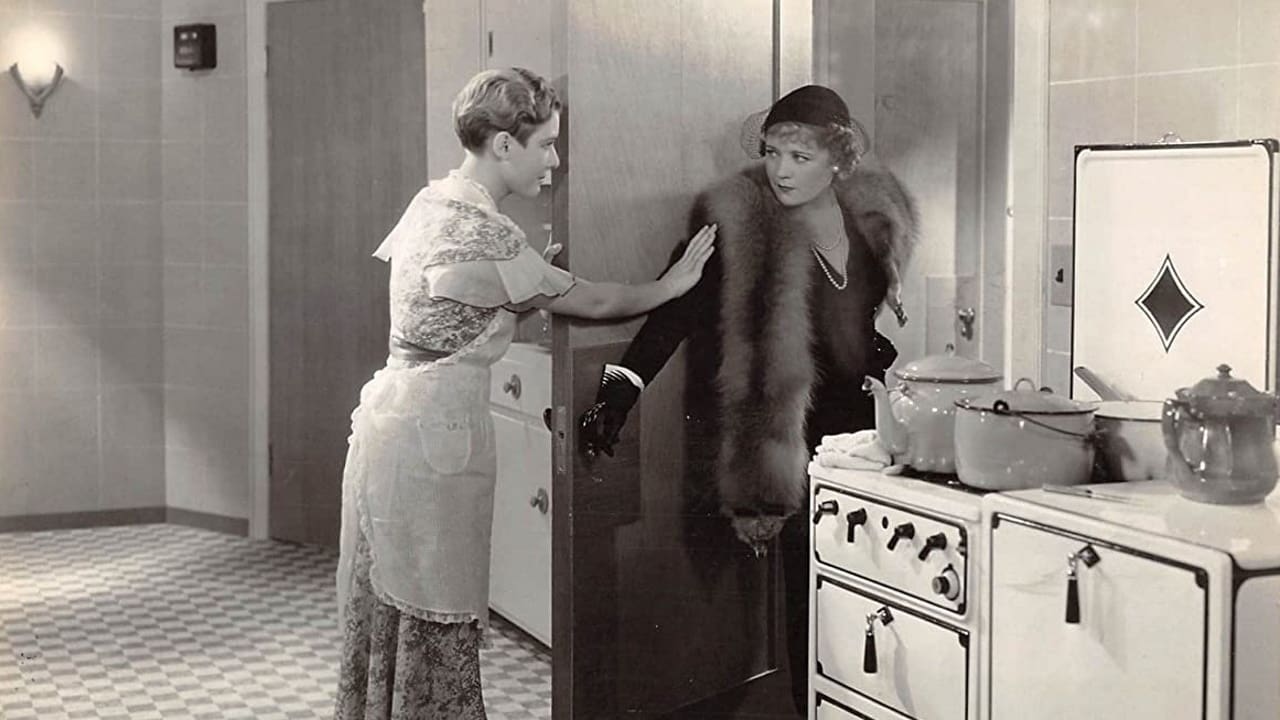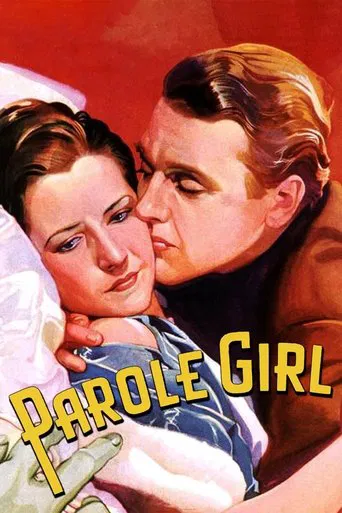

Bad girl Mae Clarke is too involved in a racket that results in payment over being wrongfully accused of being a pick-pocket. Along with shady partner Hale Hamilton, Clarke goes from department store to department store, using the phony accusation of stealing Hamilton's wallet as a way of extorting money from the department store management. She doesn't count on an insurance company catching onto her racket, ending up in jail for her petty crime yet paroled for trying to put out a fire she deliberately started simply so she could be paroled. Recognizing drunken department store insurance manager Ralph Bellamy who had refused to help her escape a prison sentence, Clarke sets up a phony marriage (with Hamilton as the justice of the peace) and sets up house with him. When con-artist fellow prisoner Marie Prevost shows up at her door, Clarke is too tempted to join in on other rackets, but will her growing feelings for Bellamy, the sap of all saps, keep her from going through with abandoning him? A clever, if somewhat preposterous plotline, helps make this pre-code drama about bad girls turning good work, along with the great performances of Clarke (aka "the grapefruit girl" from "The Public Enemy"), Bellamy, Hamilton, Ferdinand Gottschalk (as Bellamy's boss) and especially Prevost. The script by Norman Krasna is filled with clever innuendos and plot developments, and the direction by Edward F. Cline is fast moving and tight. Every set-up of each plot development is exceptionally clever, and as a result, this ends up being one of the great sleepers of the pre-code drama that just a year later would be too scandalous to be made into a film. Clarke is extremely unique as a leading lady and gives one of her best performances. Gottschalk is adorable as the lovable old coot who loves to cook and enjoys watching Bellamy and Clarke be affectionate as they dine on his delectables, even if their marriage unbeknownst to him is a sham. Prevost, in her last major role, is an absolute delight, stealing every moment she is on screen, making me wonder why she would soon be reduced to bit parts that lead to an early death just a few years later.
... View MoreWith a title like that - and with Mae Clarke best remembered today as a punchbag for Jimmie Cagney - one approaches this film expecting gritty lowlife drama. This expectation is reinforced by an extremely atmospheric opening sequence (which makes excellent use of tracking shots and realistic sound), seemingly shot in a genuine department store, with store detective Lee Phelps pursuing Miss Clarke as she heads for the exit after a customer loudly accuses her of picking his pocket. She ends up going to jail after the manager of a different store, Ralph Bellamy, refuses her pleas for mercy for a different offence (Bellamy's explanation that "the store's rule has always been to prosecute, our insurance company insists upon it" carries the hint that the brutal, unyielding capitalist system bears some of the blame for her plight); and her time in jail culminates in a superbly staged sequence set in the prison workshop when she demonstrates neither for the first or last time her adroitness as a manipulator by deliberating starting a fire and then 'heroically' turning an extinguisher on it.The film's title and her journey through the lower depths can in retrospect can be seen as Depression-era window dressing serving as a prologue to the vengeful game of marital cat-&-mouse Clarke then begins at the expense of the hapless Bellamy when she emerges from prison, which comprises the rest of the film. Five years earlier with a racier title implying sexual rather than criminal intrigue this story could easily have been a vehicle for the likes of Norma Shearer, with both the many preposterous plot contrivances resembling those of a silent film, and Clarke's chic boyish haircut reinforcing her resemblance to a silent film heroine. Aided by elegant photography by the great Joseph August, Eddie Cline so deftly handles both the early action & drama and the later scenes of sexual tension that it may after all be worth investigating his filmography beyond the vehicles for W.C.Fields with which his name is associated.A charming cameo by Ferdinand Gottschalk as Bellamy's boss deserves particular mention in a uniformly good cast; and Mae Clarke here turns in a real star performance displaying a wide emotional range as well as a rapport with Bellamy. Unfortunately she was on the very brink of a precipitous fall from grace as the result of the double-whammy of a nervous breakdown brought on by overwork in June 1932, followed by a car accident in which her jaw was broken the month 'Parole Girl' was released in March 1933. She thus well exemplifies that lost generation whose work continues to surprise and delight discoverers of pre-Code Hollywood.
... View MoreMae Clarke, she of the grapefruit in the face, and Ralph Bellamy star in "Parole Girl," a 1933 film.Clarke plays Sylvia, who works a department store con with a male partner. He accuses her of stealing his wallet and yells "stop, thief," they both go to the manager's office, he finds his wallet, she sobs, and the store pays her off. Unfortunately the police alert the store to the con artists as she's sitting in the office. Terrified of going to prison, she begs the manager to let her go. He wants to, but when he checks with the man above him, Joe Smith (Bellamy) he says he has no power to do that. She begs and sobs, but it's no go.Sylvia winds up in prison, serving for a year, but she manages to not only start a fire, but work to put it out, and then faint - all part of her plan. She is released due to her heroics. She's not interested in returning to con work. She wants to destroy the life of Joe Smith.Sylvia approaches Joe while he's smashed and stages a fake marriage, knowing full well he has a wife from whom he's separated. She then blackmails him with his bigamy. They have to act as a married couple until Sylvia's parole is over. Guess what happens.This could have been an ordinary movie but it isn't, thanks to the nice work of the two stars. Clarke is an underrated actress - she was excellent in the 1930 Waterloo Bridge, which is much grittier than the Taylor-Leigh version. She was a very honest actress, not at all over the top, even though it was the style of the day.Bellamy, of course, is super. This film was just after the beginning of his awesome 60-year career.Entertaining.
... View MoreParole Girl (1933) ** 1/2 (out of 4)Silly but extremely entertaining drama from Columbia has Mae Clarke once again taking "C" level material and raising it a notch. This time out she plays a troubled but smart woman in a con game with a man (Hale Hamilton) who pretty much owns her. She ends up in jail after getting caught ripping off shopping stores and once behind bars she swears vengeance on the insurance man (Ralph Bellamy) who refused to give her a break and demand that she go to jail. This is an extremely bizarre and strange little gem that will certainly keep fans of "B" movies entertained because you'll never quite know where the thing is going. For starters, the story itself is downright stupid as we're never really given a good reason as to why this woman would be so angry with this man. Why not the judge, store owner or the con man who got her into the racket? You also have to consider the fact that she's never seen this man so how she actually manages to do her thing is never quite clear. Another funny thing with the story is that it of course has to have a few twists and turns, which includes the woman eventually falling for the man but soon her scam backfires once again with a twist that I won't ruin here. Clarke turns in a very good performance and it certainly ranks as one of the best I've seen from her. She's very believable in the early scenes of fear as she begs not to be sent to jail. She's also believable as the hell bent femme fatale out for revenge. She plays both sides of the coin perfectly and her chemistry with Bellamy is very realistic and makes for an interesting 65-minutes. Bellamy, one of my favorite character actors from this period, manages to have all the charm and dignity that we've come to expect from him. Marie Prevost is quite annoying but that's the way her character was meant to be. This film has certainly been forgotten throughout the decades and I'm sure not too many were overly interested in it back when it was released. I'm sure most people, like myself, will be drawn to it because they're fans of FRANKENSTEIN and want to see Clarke in another role. Those people will certainly want to check this film out but fans of "B" movies will as well as the movie goes fast enough to not have any dull moments and in the end it's the perfect filler if you're up late at night and need something quick to watch.
... View More